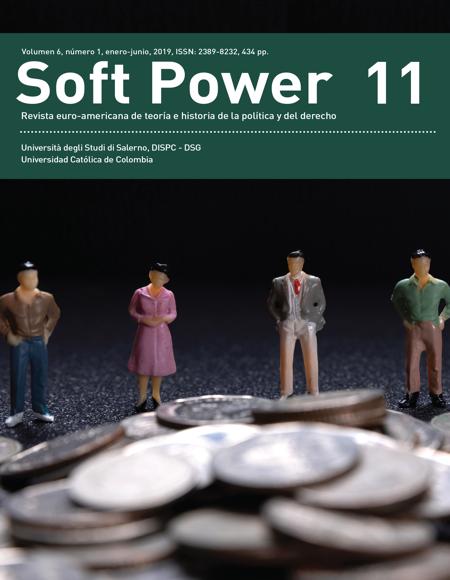Abstract
Neoliberalism gives the State the task of monitoring the laws of the market and, in this sense; it uses competition as a tool for the political direction of its members. The consequence is the isolation of the individual from the market, which condemns him to have only the behaviors that are automatic reactions to the stimuli produced by it. An alternative to this situation is to strengthen anti-fascist constitutionalism, which promotes economic democracy as well as political democracy. In this scenario, the State is obliged to implement substantial equality outside the market through welfare, but also in the market itself, balancing social weakness with legal force. Thus, it is the task of the public authorities to redistribute the weapons of social conflict and, in this way, to re-politicize the economic order.

References
Abendroth, W. (1954). Begriff und Wesen des sozialen Rechtsstaates. Veröffentlichungen der Vereinigung der Deutschen Staatsrechtslehrer, 12, 85-92
Arndt, A. (1946a). Das Problem der Wirtschaftsdemokratie. Süddeutsche Juristen-Zeitung, 1, 137-141.
Arndt, A. (1946b). Planwirtschaft. Erwiderung auf den Aufsatz von Prof. Dr. Franz Böhm über Die Bedeutung der Wirtschaftsordnung für die politische Verfassung. Süddeutsche Juristen-Zeitung, 1, 169-171.
Audier, S. (2012). Le Colloque Walter Lippman: Aux origines du néo-libéralisme. Lormont: Bord de l’eau.
Barba A., M. Pivetti (2016). La scomparsa della sinistra in Europa. Reggio Emilia: Imprimatur.
Blum, R. (1969). Soziale Marktwirtschaft. Wirtschaftspolitik zwischen Neoliberalismus und Ordoliberalismus. Tübingen: Mohr Siebeck.
Boeckh J. et al. (2017). Sozialpolitik in Deutschland. Wiesbaden: Springer VS.
Böhm, F. (1937). Die Ordnung der Wirtschaft als geschichtliche Aufgabe und rechtsschöpferische Leistung. Ordnung der Wirtschaft. Stuttgart. Berlin: Kohlhammer.
Böhm, F. (1946). Die Bedeutung der Wirtschaftsordnung für die politische Verfassung. Süddeutsche Juristen-Zeitung, 1, 141-149.
Böhm, F. (1951). Das wirtschaftliche Mitbestimmungsrecht der Arbeiter im Betrieb. Ordo, 4, 21-250.
Bourgeois, L. (1902). Solidarité. Paris: A. Colin.
Brüggemeier, G. (1979). Entwicklung des Rechts im organisierten Kapitalismus. Frankfurt am Main: Syndikat.
Commissione reale per il dopoguerra (1919). I problemi economici urgenti. Relazione del deputato Edoardo Pantano Presidente della Sottocommissione economica. Roma: Tip. Bertero.
Commissione reale per il dopoguerra (1920). Studi e proposte della prima sottocommissione presieduta dal Senatore Vittorio Scialoja. Roma: Tip. Artigianelli.
Comte, A. (1938). Philosophie positive (1830-42). Paris: R. Flammorion.
Duguit, L. (1920). Les transformations générales du droit privé depuis le Code Napoléon. Paris : F. Alcan.
Eucken, W. (1932). Staatliche Strukturwandlungen und die Krisis des Kapitalismus. Weltwirtschaftliches Archiv, 36, 297-32.
Gierke, O. (1889). Die soziale Aufgabe des Privatrechts. Berlin: J. Springer.
Haselbach, D. (1991). Autoritärer Liberalismus und Soziale Marktwirtschaft. Gesellschaft und Politik im Ordoliberalismus. Baden-Baden: Nomos.
Haupt, H.-G. (1989). Sozialgeschichte Frankreichs seit 1789. Frankfurt am Main: Suhrkamp.
J.P. Morgan (2013). The Euro area adjustment: about halfway there. Recuperado de https://www.europe-solidarity.eu/documents/ES1_euro-area-adjustment.pdf.
Knight, F.H. (1938). Lippmann’s The Good Society. Journal of Political Economy, 46, 864-872.
Krüger, H. (1964). Allgemeine Staatslehre. Stuttgart: Kohlhammer.
Lippmann, W. (2005). The Good Society (1937). New Brunswick y London: Transaction Publishers.
Locke, J. (1980). Second Treatise of Government (1689). Indianapolis. Cambridge: Hacket Publ. Company.
Müller-Armack, A. (1932). Entwicklungsgesetze des Kapitalismus. Ökonomische, geschichtstheoretische und soziologische Studien zur modernen Wirtschaftsverfassung. Berlin: Junker & Dünnhaupt.
Müller-Armack, A. (1956). Voce Soziale Marktwirtschaft. En Handwörterbuch der Sozialwissenschaften (pp. 390-392). Stuttgart: G. Fischer.
Pianta, M. (2012). L’Europa della finanza, en Parolechiave, 48, 103-121.
Polanyi, K. (2001). The Great Transformation: The Political and Economic Origins of Our Time Boston: Beacon Press.
Portalis, J.-É.-M. (1804). Exposé des motifs de la loi relative à la Propriété. En Code civil des Français, suivi de l’exposé des motifs, sur chaque lois, présenté par les Orateurs du Gouvernement…, vol. 4 (pp. 25-48). Paris: F. Didot.
Ptak, R. (2004). Vom Ordoliberalismus zur Sozialen Marktwirtschaft. Stationendes Neoliberalismus in Deutschland. Oplade: Leske + Budrich.
Ritter, G.A. (1996). Storia dello Stato sociale (1991). Roma y Bari: Laterza.
Romagnoli, U. (2016). Autonomia e subordinazione del diritto del lavoro. Per i 30 anni di Lavoro e diritto. Introduzione. En Lavoro e Diritto, 567-569.
Röpke, W. (1962). Epochenwende, (1933). En Id., Wirrnis und Wahrheit. Ausgewählte Aufsätze (pp. 105-124). Erlenbach y Stuttgart: Rentsch.
Rüstow, A. (1959). Diktatur innerhalb der Grenzen der Demokratie. Vierteljahreshefte für Zeitgeschichte, 7, 87-102.
Rüstow, A. (1932). Interessenpolitik oder Staatspolitik. Der deutsche Volkswirt, 7, 169-172.
Rüstow, A. (2001). Das Versagen des Wirtschaftsliberalismus, 2. ed. (1950). Marburg: Metropolis.
Rüstow, A. (2012). En S. Audier (ed.), Le Colloque Walter Lippman: Aux origines du néo-libéralisme (pp. 467-472). Lormont: Bord de l’eau.
Schmitt, C. (1933). Starker Staat und gesunder Wirtschaft. Volk und Reich, 2, 81-94.
Simitis, S. (2001). The Case of the Employment Relationship. En W. Steinmetz (ed.), Private Law and Social Inequality in the Industrial Age. Comparing Legal Cultures in Britain, France, Germany, and the United States (pp. 181-202). Oxford: Oxford University Press.
Smith, A. (2009). The Theory of Moral Sentiments (1759). London: Penguin.
Somma, A. (2005). I giuristi e l’Asse culturale Roma-Berlino. Economia e politica nel diritto fascista e nazionalsocialista. Frankfurt am Main: V. Klostermann.
Somma, A. (2011). Democrazia economica e diritto privato. Contributo alla riflessione sui beni comuni. En Materiali per una storia della cultura giuridica, 41, 461-494.
Somma, A. (2015). Giustizia o pacificazione sociale? La codeterminazione nello scontro tra modelli di capitalismo. Politica del diritto, 549-574.
Somma, A. (2017). Europa a due velocità. Postpolitica dell’Unione europea. Reggio Emilia: Imprimatur.
Starbatty, J. (2002). Ordoliberalismus, en O. Issing (ed.), Geschichte der Nationalökonomie, 4. ed. (pp. 251-270). München: F. Vahlen.
Stolfi, N. (1919). Diritto civile, vol. 1 (Parte general). 1 t. (Fonti, disposizioni preliminarie transitorie). Torino: Utet.
Stolfi, N. (1922). La rivoluzione francese e la guerra mondiale. Rivista di diritto pubblico, 14, 385-408.
von Hayek, F.A. (1976). Law Legislation an Liberty, vol. 2 (The Mirage of Social Justice). Chicago and London: University of Chicago Press.
Weber, M. (2000). Economia e società. Torino: Ed. Comunità.













